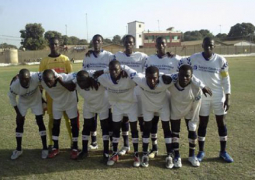
A high powered Gambian Human Rights Delegation, headed by DR. Henry D.R. Carrol, returned home in the wee hours of 24th November 2011, (The Gambia’s Presidential Election Day), after ably representing The Republic Of The Gambia, at an International Experts Human Rights Conference, which was organized and fully sponsored by The University Of Bristol, School Of Law (U.K.), at The United Nations Conference Centre, in Addis Ababa, from 21st to 22nd November 2011. The delegation members arrived in record time, to avail themselves of the golden opportunity, to exercise their Constitutional “right to vote”, which is clearly guaranteed, by Section 26 Of The 1997 Constitution, Of The Second Republic Of The Gambia.
The distinguished Members of The Gambia’s Human Rights Delegation, composed of the following personalities:-
1. DR. Henry D.R. Carrol, Senior Human Rights Lawyer, Chairman Of The Law Reform Commission and Law Lecturer – University Of The Gambia – Head Of National Delegation.
2. MR Sheikh E.T. Lewis (Snr)
President / Executive Director of International Society For Human Rights (I.S.H.R.)
3. Mrs Isatou Alwar Graham,
Human Rights Lawyer and the Curator at the Attorney General’s Chambers & Ministry Of Justice – Member Of National Delegation.
4. Commissioner Landing Kinteh of The
5. MR Amadou Ceesay, Programme Officer, African Centre For Democracy And Human Rights Studies (A.C.D.H.R.S), - Member Of National Delegation.
The
The diverse Delegates who attended the Conference, were classified into the following categories:-
1. International, Regional and United Nations Organisations.
2. Government Representatives
3. Members of The Academia (i.e. Universities and Institutions of higher learning).
4. National Human Rights Institutions and
5. Civil Society Organisations.
The first Plenary Session of the Conference, took place in the morning of 21st of November 2011, and delegates debated or deliberated on the topic:- “FOLLOW UP TO DECISIONS ON COMMUNICATIONS OF THE AFRICAN COMMISSION. WHAT GOVERNMENT MECHANISMS ARE AVAILABLE?” Among other Speakers, two Members of The Gambia’s Human Rights Delegation, namely: DR. Henry D.R. Carrol and Mrs. Isatou Alwar Graham, presented laconic and though provoking Papers to the Conference, after which, the Chairman of the first Plenary Session of the Conference, MR Roland Adjovi, from Arcadia University in Tanzania, opened the floor to delegates, for questions, commentaries and answers.
The second Plenary Session of the Conference, took place on the 21st of November 2011, and delegates debated and deliberated on the topic:- “FOLLOW UP TO DECISIONS ON COMMUNICATIONS OF THE AFRICAN COMMISSION. WHAT CIVIL SOCIETY AND OTHER MECHANISMS ARE AVAILABLE?” After three Speakers or Resource Persons presented their Papers to the Conference, the Chairperson of the second Plenary Session, Ms Sheila Keetharuth, a Barrister-At-Law who doubles as the Executive Director of the Institute For Human Rights And Development (I.H.R.D.) in The Gambia, opened the floor to delegates, for questions, commentaries and answers.
In the afternoon of 21st November 2011, the delegates were divided into two Working Groups, to debate and deliberate on the issues, which emanated from the Papers which had been presented.
From the very beginning of the Conference, the organizers of the Conference, made this important remark to all the distinguished delegates “….. we do not wish for the Conference to be confrontational or adversarial in its approach, and wish to use it as a way of identifying what mechanisms may (or may not) be in place Nationally.”
In the evening of 21st November 2011, the Report Back Session from the two Working Groups was conducted. After the Rapporteurs of the Working Groups presented their reports to this Session, (which was also a Plenary Session), the Chairperson of the Session, Ms Debra Long, a Human Rights Lawyer, at the Human Rights Implementation Centre (H.R.I.C.), which is within the School Of Law of The University Of Bristol, opened the floor to the delegates, for questions, commentaries and answers. The activities of the first day of the Conferences, concluded with an Evening Reception / Dinner for the delegates, which was organized at Le Grand Reve Restaurant in
The fourth Plenary Session of the Conference, took place in the morning of 22nd November 2011. The distinguished delegates were tasked to debate and deliberate on the topic “THE ROLE OF THE AFRICAN REGIONAL HUMAN RIGHTS SYSTEM IN FOLLOW UP TO DECISIONS ON COMMUNICATIONS OF THE AFRICAN COMMISSION.” Two of the three selected Speakers were present, namely DR. Robert Eno of The African Court On Human And People’s Rights, based in
In the afternoon of 22nd November 2011, the delegates were again divided into two Working Groups, to debate and deliberate on the issues, which emanated from the third and fourth Plenary Sessions.
In the evening of 22nd November 2011, the Report Back Session from the second two Working Groups was conducted. After the Rapporteurs of the second two Working Groups presented their Reports to this Session (i.e. the fifth and final Plenary Session), the Chairman of this Session, Professor Malcolm David Evans, a Professor Of Public International Law, at The University Of Bristol, School Of Law, who doubles as the Chairman of The United Nations Sub – Committee For The Prevention Of Torture, opened the floor to delegates, for questions, commentaries and answers. Professor Evans then made an elaborate and highly impressive Closing Remarks of the Conference, after a short Closing Speech from Ms Debra Long. The Head of The Gambia’s Human Rights Delegation, DR. Henry D.R. Carrol, was democratically elected, to deliver an eloquent Vote Of Thanks, on behalf of all the other delegates, to the able organizers of the International Human Rights Conference.


